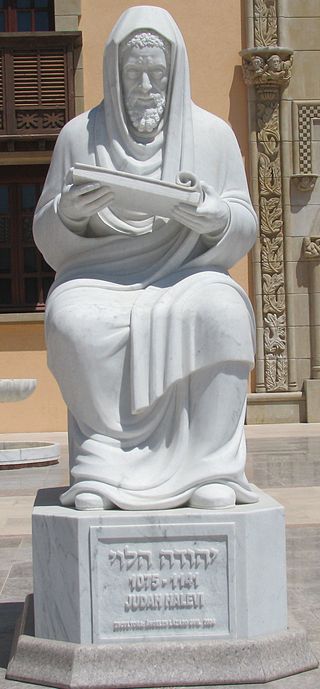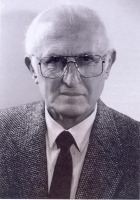Related Research Articles

Abraham ben Meir Ibn Ezra was one of the most distinguished Jewish biblical commentators and philosophers of the Middle Ages. He was born in Tudela, Taifa of Zaragoza.

Jewish philosophy includes all philosophy carried out by Jews, or in relation to the religion of Judaism. Until modern Haskalah and Jewish emancipation, Jewish philosophy was preoccupied with attempts to reconcile coherent new ideas into the tradition of Rabbinic Judaism, thus organizing emergent ideas that are not necessarily Jewish into a uniquely Jewish scholastic framework and world-view. With their acceptance into modern society, Jews with secular educations embraced or developed entirely new philosophies to meet the demands of the world in which they now found themselves.

Judah Halevi was a Spanish Jewish poet, physician and philosopher. He was born in Spain, either in Toledo or Tudela, in 1075. He is thought to have died in 1141, in either Jerusalem, at that point the Crusader Kingdom of Jerusalem, or in Alexandria, Egypt.
The golden age of Jewish culture in Spain, which coincided with the Middle Ages in Europe, was a period of Muslim rule during which, intermittently, Jews were generally accepted in society and Jewish religious, cultural, and economic life flourished.

Dunash ha-Levi ben Labrat was a medieval Jewish commentator, poet, and grammarian of the Golden age of Jewish culture in Spain. He is known for his philological commentary, Teshuvot Dunash, and for his liturgical poems D'ror Yiqra and D'vai Haser.
Solomon ibn Gabirol or Solomon ben Judah was an 11th-century Andalusian poet and Jewish philosopher in the Neo-Platonic tradition. He published over a hundred poems, as well as works of biblical exegesis, philosophy, ethics and satire. One source credits ibn Gabirol with creating a golem, possibly female, for household chores.

Hasdai ibn Shaprut born about 915 at Jaén, Spain; died about 970 at Córdoba, Andalusia, was a Jewish scholar, physician, diplomat, and patron of science.

Yehuda Alharizi, also Judah ben Solomon Harizi or al-Harizi, was a rabbi, translator, poet, and traveler active in al-Andalus. He was supported by wealthy patrons, to whom he wrote poems and dedicated compositions.
Rabbi Moses ben Jacob ibn Ezra, known as Ha-Sallaḥ was an Andalusi Jewish philosopher, linguist, and poet. He was born in Granada about 1055 – 1060, and died after 1138. Ibn Ezra is considered to have had great influence in the Arabic literary world. He is considered one of Spain's greatest poets and was thought to be ahead of his time in terms of his theories on the nature of poetry. One of the more revolutionary aspects of Ibn Ezra's poetry that has been debated is his definition of poetry as metaphor and how his poetry illuminates Aristotle's early ideas. The impact of Ibn Ezra's philosophical works was minor compared to his impact on poetry, but they address his concept of the relationship between God and man.
Samuel ibn Naghrillah, mainly known as Shmuel HaNagid and Isma’il ibn Naghrilla, was a medieval Sephardic Jewish Talmudic scholar, grammarian, philologist, soldier, merchant, politician, and an influential poet who lived in Iberia at the time of the Moorish rule. Additionally, he held the position of Prime Minister of the Taifa of Granada and served as the battlefield commander of the Granadan army, making him arguably the most politically influential Jew in Islamic Spain.

Hebrew literature consists of ancient, medieval, and modern writings in the Hebrew language. It is one of the primary forms of Jewish literature, though there have been cases of literature written in Hebrew by non-Jews. Hebrew literature was produced in many different parts of the world throughout the medieval and modern eras, while contemporary Hebrew literature is largely Israeli literature. In 1966, Agnon won the Nobel Prize for Literature for novels and short stories that employ a unique blend of biblical, Talmudic and modern Hebrew, making him the first Hebrew writer to receive this award.

Jewish literature includes works written by Jews on Jewish themes, literary works written in Jewish languages on various themes, and literary works in any language written by Jewish writers. Ancient Jewish literature includes Biblical literature and rabbinic literature. Medieval Jewish literature includes not only rabbinic literature but also ethical literature, philosophical literature, mystical literature, various other forms of prose including history and fiction, and various forms of poetry of both religious and secular varieties. The production of Jewish literature has flowered with the modern emergence of secular Jewish culture. Modern Jewish literature has included Yiddish literature, Judeo-Tat literature, Ladino literature, Hebrew literature, and Jewish American literature.
Moses ben Hanoch or Moses ben Enoch was a medieval rabbi who inadvertently became the preeminent Talmudic scholar of Spain. He died about 965.
Jacob ibn Jau was a Jewish silk-manufacturer at Cordova, occupying a high position at the court of the Umayyad Caliph Hisham II. He died about 1000. Amador de los Ríos calls him "Ibn Gan."
Isaac ben Judah ibn Ghiyyat (1030/1038–1089) was a Spanish rabbi, Biblical commentator, codifier of Jewish law, philosopher, and liturgical poet. He was born and lived in the town of Lucena, where he also headed a rabbinic academy. He died in Cordoba.
Hanoch bar Moses was a rabbi of al-Andalus. Almost all of the information we have about him comes from the Sefer ha-Qabbalah by Abraham ibn Daud.

Ezra Fleischer was a Romanian-Israeli Hebrew-language poet and philologist.
The golden age of Jewish poetry in Al-Andalus developed in the literary courts of the various taifas. Like its Arabic counterpart, its production diminished in the 12th century under the rule of the Almoravids and Almohads. In the last part of the 10th century, Dunash ben Labrat revolutionized Jewish poetry in Al-Andalus by bringing Arabic meter and monorhyme into Hebrew writing. Jewish poets employed Arabic poetic themes, writing bacchic poetry, garden poetry, and love poetry.
Moses bar Samuel ha-Kohen ibn Gikatilla was a Jewish grammarian and Bible exegete of the late eleventh century.
References
- ↑ Yehoshua Granat, Psalms Recalled: Scriptural Psalms in the Liturgical Poetry of Yoseph Ibn Abitur (Hebrew: אזכרה מזמור: מזמורי תהילים בפיוטי יוסף אבן אביתור), Jerusalem: Yad Ben-Zvi, 2021.